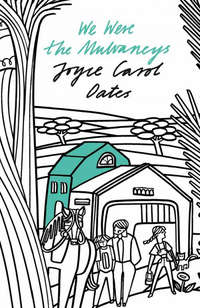
Полная версия
A Widow’s Story: A Memoir
In a warm rapid liquidy voice Dr. I_ speaks to us. Formally he addresses us as Mr. Smith, Mrs. Smith. Some of what he says I comprehend, and some of it I don’t comprehend. I am so grateful for Dr. I_’s very existence, I could kiss his hand. I think Here is a man who knows! Here is an expert.
But is the Widow-to-Be misguided? Is her faith in this stranger in a white coat who walks into her husband’s hospital room misplaced? Would there have been another, happier ending to this story, if she had transferred her husband from the provincial New Jersey medical center to a hospital in Manhattan, or Philadelphia? If she’d been less credulous? More skeptical?
As if she too has been invaded—infected—by a swarm of lethal bacteria riotously breeding not in her lungs but in that part of her brain in which rational thought is said to reside.
Chapter 6 E-mail Record
February 12, 2008.
To Richard Ford
At this moment, Ray is recovering from a nasty cold that morphed into pneumonia without our somehow noticing . . .
Much love to both,
Joyce
To Leigh Bienen
Ray is recovering—slowly—from a severe pneumonia that began as a bad cold . . .
Much love to both,
Joyce
February 14, 2008.
To Gloria Vanderbilt
Ray’s condition improves—worsens—improves—worsens—I have almost given up having responses to it. But the doctors say that over all he is definitely improving—it’s just that the pneumonia is so virulent, through most of one lung.
(I know little of infectious diseases, but am learning rapidly.)
Love
Joyce
Chapter 7 E. coli
February 13, 2008. The bacterial infection in Ray’s right lung has been identified: E. coli.
“E. coli! But isn’t that associated with . . .”
“Gastro-intestinal infections? Not always.”
So we learn from Dr. I_ . Again we’re astonished, naively—there is something naive about astonishment in such circumstances—for like most people we’d thought that the dread E. coli bacteria is associated exclusively with gastro-intestinal infections: sewage leaking into water supplies—fecal matter in food—insufficiently cooked food—hamburger raw at the core—contaminated lettuce, spinach—the stern admonition above sinks in restaurant restrooms Restaurant employees must wash their hands before returning to work.
But no, we were mistaken. Even as, invisibly, a colony of rapacious E. coli bacteria is struggling to prevail in Ray’s right lung with the intention of swarming into his left lung and from there into his bloodstream to claim him, their warm-breathing host, totally—as totally as a predator-beast like a lion, an alligator, would wish to devour him—so we are learning, we are being forced to learn, that many—most?—of our assumptions about medical issues are inadequate, like the notions of children.
It’s liquidy-voiced Dr. I_—or another of Dr. I_’s white-coated colleagues—(for in his scant six days in the Telemetry Unit of the Princeton Medical Center Ray will be examined or at least looked at by a considerable number of specialists as itemized by the hospital bill his widow will receive weeks later)—who explain to us that E. coli infections, far from being limited to the stomach, can also occur in the urinary tract and in the lungs. Escherichia coli are found everywhere, the doctor tells us—in the environment, in water—“In the interior of your mouth.”
Most of the time—we’re assured—our immune systems fight these invasions. But sometimes . . .
Patients with E. coli pneumonia usually present with fever, shortness of breath, increased respiratory rate, increased respiratory secretions, and “crackles” upon auscultation.
(Why do medical people say “present” in this context? Do you find it as annoying as I do? As if one “presents” symptoms in some sort of garish exhibition—Patient Ray Smith presents fever, shortness of breath, increased respiratory rate . . .)
Now the exact strain of bacteria has been identified, a more precise antibiotic is being used, mixed with IV fluids dripping into Ray’s arm. This is a relief! This is good news. Impossible not to think of the antibiotic treatment as a kind of war—warfare—as in a medieval allegory of Good and Evil: our side is “good” and the other side is “evil.” Impossible not to think of the current war—wars—our country is waging in Iraq and Afghanistan in these crude theological terms.
As Spinoza observed All creatures yearn to persist in their being.
In nature there is no “good”—no “evil.” Only just life warring against life. Life consuming life. But human life, we want to believe, is more valuable than other forms of life—certainly, such primitive life-forms as bacteria.
Exhausted from my vigil—this vigil that has hardly begun!—I slip into a kind of waking sleep at Ray’s bedside as he dozes fitfully inside the oxygen mask and in my dream there are no recognizable figures only just primitive bacterial forms, a feverish swilling and rushing, a sensation of menace, unease—those hallucinatory patterns of wriggling light obscuring vision that are said to be symptomatic of migraine, though I’ve never had migraine headaches. My mouth has gone dry, sour. My mouth feels like the interior of a stranger’s mouth and is loathsome to me. The jeering thought comes to me You must have been infected too. But you have been spared this time.
Waking I’m not sure at first where I am. The sensation of unease has followed me. And there in the hospital bed—my husband?—some sort of disfiguring helmet, or mask, obscuring his face that has always seemed to me so handsome, so youthful, so good . . .
Something of the derangement of Widowhood is beginning here. For in dreams our future selves are being prepared. In denial that her husband is seriously ill the Widow-to-Be will not, when she returns home that evening, research E. coli on the Internet. Not for nearly eighteen months after her husband’s death will she look up this common bacterial strain to discover the blunt statement she’d instinctively feared at the time and could not have risked discovering: pneumonia due to Escherichia coli has a reported mortality rate of up to 70 percent.
Chapter 8 Hospital Vigil(s)
There are two categories of hospital vigils.
The vigil with the happy ending, and the other.
Embarked upon the hospital vigil as in a small canoe on a churning white-water river you can have no clear idea which vigil you are embarked upon—the vigil with the happy ending, or the other—until it has come to an end.
Until the patient has been discharged from the hospital and brought safely home. Or not discharged, and never brought home.
Chapter 9 Jasmine
February 14, 2008. Today in room 541 there is Jasmine—dark-skinned, Haitian, lives with relatives in Trenton and hates the “nasty” New Jersey winter—a nurse’s aide assigned to Raymond Smith who will bathe the patient behind a screen, change bedclothes and adjust his bed, assist him walking into the bathroom, chattering all the while at him, now at me—Mz. Smith h’lo? Mz. Smith howya doing?—voice high-pitched as the cry of a tropical bird. Initially Jasmine is a cheery presence in the room—like the flowers several friends have sent, in vases on Ray’s bedside table—she’s warm, friendly, eager to please—eager to be liked—eager to be very well liked—a squat sturdy young woman with cornrowed hair, fleshy cheeks and shiny dark eyes behind thick-lensed red plastic glasses—but as the minutes pass and Jasmine continues to chatter at us, and to bustle about the room, sighing, laughing, muttering to herself—her presence becomes a distraction, an irritant.
Propped up in bed, breathing now through a nasal inhaler, Ray is gamely trying to sort through some of the mail he’s asked me to bring him—here are financial statements, letters from Ontario Review writers, poetry and short story submissions—at his bedside I am trying to prepare my next-day’s fiction workshop at Princeton University—still Jasmine chatters, and chatters—our lack of response doesn’t seem to discourage her, or perhaps she hasn’t noticed—until abruptly she makes a hissing sound through her teeth as if in disgust—like a petulant child she takes up the TV remote control and switches on the TV—loud—we ask her please turn it off, we are trying to work—Jasmine stares at us as if she has never heard such a request—she tells us that she always watches TV in these rooms—with exaggerated politeness verging upon hostility she asks if she can keep the TV on—Turned low?—in her white nylon uniform that strains at her fleshy hips and thighs sitting now in a chair beneath the TV gazing upward at the screen rapt in concentration at antic darting images as if these images were of paramount importance to her provoking her to suck at her lips, murmur and laugh to herself, draw in her breath sharply—Ohhhh man! Uhhhh!—until after some time—twenty minutes, twenty-five—as if the magical screen suddenly loses its attraction Jasmine turns back to us with renewed enthusiasm—as the TV crackles and drones she resumes the bright-chattering bird-shriek that makes me want to press my hands over my ears even as I am smiling—smiling so hard my face aches—not wanting Jasmine to be insulted by some lapse in my attention or some failure to respect her personality which in some quarters has surely been praised, encouraged—as Ray shuts his eyes in misery—trapped in the hospital bed by the IV tube in a vein in the crook of his bruised right arm, nasal inhaler clamped to his head—forced as in an anteroom of Hell to listen as Jasmine begins to repeat her monologue of a former patient who’d been really nice to her—really really nice to her—and his wife as well—they’d given her real special presents—sent her a postcard Dear Jasmine! from the Southwest—really really nice generous people—an older couple—really nice—as I listen to these boastful yet accusatory words a wave of dismay washes over me—a stab of fear—is this nurse’s aide employed by the Princeton Medical Center retarded? Is she mentally unstable? Disturbed? Deranged?
None of the other, older nurses resemble Jasmine in any way—Jasmine seems to have wandered in from another dimension, a Comedy Central TV program perhaps, except Jasmine isn’t funny—Jasmine is deadly serious—I try to explain that my husband is tired and would like to rest—trying to smile—trying to speak politely—in dread of upsetting the excitable young woman—finally saying in a forceful voice Excuse me—Jasmine—my husband is tired, he would like to sleep—provoking Jasmine to stare at us in astonishment—for a beat unable to speak, she’s so stunned—insulted—a look of exaggerated shock contorting her face as in a children’s cartoon—Ma’am!—You are telling me to be quiet? To stop talking? Is that what you are telling me Ma’am—to stop talking? Jasmine’s shiny eyes bulge behind the thick lenses of her glasses. The whites of her eyes glare. I tell Jasmine that my husband tires easily, he has pneumonia she must know—he doesn’t sleep well at night and should try to rest during the day and if he isn’t able to sleep at least he could close his eyes and rest—as Jasmine continues to glare at me and when my voice trails off she retorts by repeating her account of the really nice older couple for whom she’d worked recently—really nice, generous—Liked me real well sayin Jasmine you a breath of fresh air always smiling—sent me a postcard sayin Jasmine howya doin—until at last I cry Please! Please just stop!
Now Jasmine’s jaw drops, she is so insulted.
Jasmine sits heavily in her chair beneath the TV. Jasmine sighs loudly, muttering to herself. Her fleshy face darkens with blood, her eyes glare whitely. She is sulky, sullen as a furious child. There is no subtlety in her hatred of us who have insulted her by failing to adore her. The thought comes to me I have made an enemy. She could kill my husband in the night.
My heart begins to beat quickly, in panic. I have brought my husband to this terrible place, now I can’t protect him. How can I protect him?
Whatever happens, I am to blame. I am the one who has arranged this.
Outside the room’s single window, it’s night. I think that very likely it has been night for a long time for night falls early in this perpetual winter dusk. I tell Jasmine that she can leave now for her supper break, if she wants to—a little early—this is a good time since I’ll be here for another hour or more.
Jasmine has been rummaging through a large cloth bag on her knees, panting with exasperation. At first she doesn’t seem to hear me—in the friendliest tone I can manage I repeat what I’ve said—Jasmine frowns, glances up—Jasmine pouts and glares—then Jasmine smiles.
Jasmine shuts the large cloth bag with a snap and smiles.
Ma’am thank you! Ma’am that is real nice.
Конец ознакомительного фрагмента.
Текст предоставлен ООО «ЛитРес».
Прочитайте эту книгу целиком, купив полную легальную версию на ЛитРес.
Безопасно оплатить книгу можно банковской картой Visa, MasterCard, Maestro, со счета мобильного телефона, с платежного терминала, в салоне МТС или Связной, через PayPal, WebMoney, Яндекс.Деньги, QIWI Кошелек, бонусными картами или другим удобным Вам способом.







